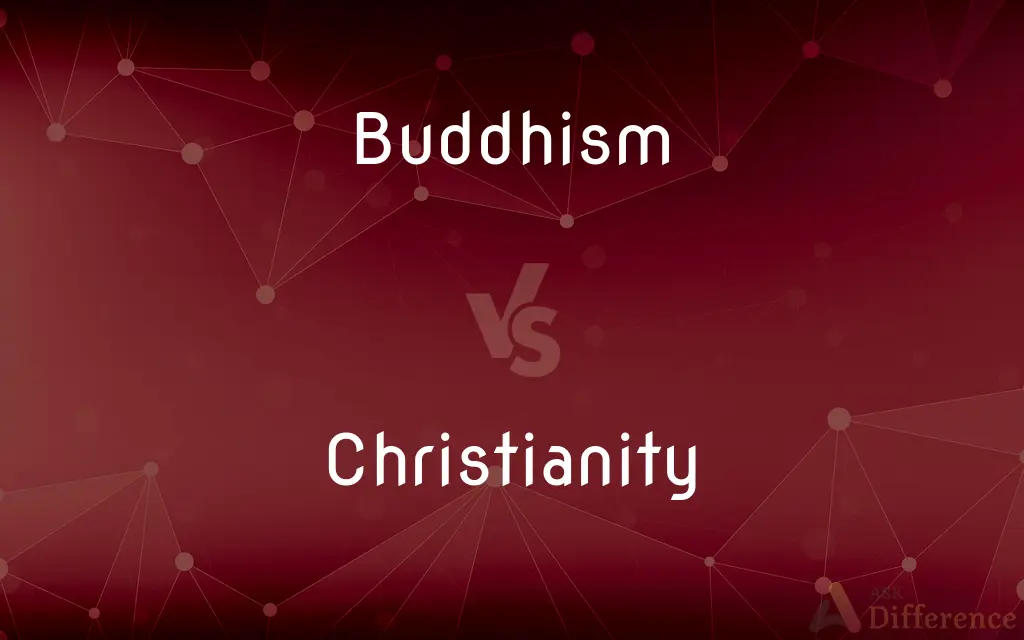Buddhism vs. Christianity — What's the Difference?
Edited by Tayyaba Rehman — By Urooj Arif — Updated on April 17, 2024
Buddhism focuses on spiritual development and the attainment of a deep insight into the true nature of life, whereas Christianity centers on the worship of God and the life and teachings of Jesus Christ.

Difference Between Buddhism and Christianity
Table of Contents
ADVERTISEMENT
Key Differences
Buddhism, originating in the Indian subcontinent, emphasizes individual spiritual development and the pursuit of enlightenment. On the other hand, Christianity, rooted in the teachings of Jesus in the Middle East, stresses faith in God and Jesus as the path to salvation.
Buddhism does not traditionally involve the worship of gods and is non-theistic, focusing instead on personal meditation and understanding of the self. Whereas Christianity is monotheistic, centering on the worship of one God and the relationship between God and humanity.
The concept of suffering and its resolution are central to Buddhism, which teaches that enlightenment achieved through the Four Noble Truths and the Eightfold Path can end personal suffering. On the other hand, Christianity teaches that salvation and eternal life are obtained through faith in Jesus, who died for humanity's sins.
Reincarnation and karma are fundamental concepts in Buddhism, influencing future lives based on one's actions. Conversely, Christianity believes in heaven and hell as final destinations after judgment, depending on faith and deeds.
The practice of Buddhism involves meditation, mindfulness, and following ethical precepts. On the other hand, Christian practice typically includes prayer, Bible study, and participation in Church sacraments like baptism and communion.
ADVERTISEMENT
Comparison Chart
Core Belief
Enlightenment through meditation and ethics
Salvation through faith in Jesus Christ
Theistic Belief
Non-theistic
Monotheistic
Concept of Afterlife
Reincarnation based on karma
Heaven or hell based on faith and actions
Key Practices
Meditation, mindfulness
Prayer, sacraments, church attendance
Foundational Texts
Tripitaka
Bible
Compare with Definitions
Buddhism
The teaching or religion of the Buddha.
Practicing the Dharma is essential for Buddhist practice.
Christianity
The embodiment of God the Son in human flesh as Jesus Christ.
Christians celebrate the Incarnation at Christmas.
Buddhism
The sum of a person's actions in this and previous states of existence, viewed as deciding their fate in future existences.
In Buddhism, good karma can lead to rebirth in a favorable condition.
Christianity
Christ's rising from the gone.
Easter is the celebration of Jesus' Resurrection.
Buddhism
The state of being free from suffering and the cycle of rebirth.
Achieving Nirvana is the ultimate goal of Buddhists.
Christianity
Deliverance from sin and its consequences, believed by Christians to be brought about by faith in Christ.
Christians believe that faith in Jesus brings salvation.
Buddhism
A state of perfect knowledge or wisdom, combined with infinite compassion.
Buddhists seek enlightenment through meditation and ethical living.
Christianity
The free and unmerited favor of God, as manifested in the salvation of sinners.
By grace, Christians believe they are saved through faith.
Buddhism
Buddhism (, US: ) is an Indian religion based on a series of original teachings attributed to Gautama Buddha. It originated in ancient India as a Sramana tradition sometime between the 6th and 4th centuries BCE, spreading through much of Asia.
Christianity
The Christian Godhead as one God in three persons: Father, Son, and Holy Spirit.
The concept of the Trinity is central to most Christian denominations.
Buddhism
A widespread Asian religion or philosophy, founded by Siddartha Gautama in north-eastern India in the 5th century BC.
Christianity
Christianity is an Abrahamic monotheistic religion based on the life and teachings of Jesus of Nazareth. It is the world's largest religion, with about 2.4 billion followers.
Buddhism
The teaching of Siddhartha Gautama that life is permeated with suffering caused by desire, that suffering ceases when desire ceases, and that enlightenment obtained through right conduct, wisdom, and meditation releases one from desire, suffering, and rebirth.
Christianity
A religion based on the life and teachings of Jesus. Most forms of Christianity hold that Jesus is the son of God and is the second person of the Trinity, through whom humans may attain redemption from sin.
Buddhism
The religion represented by the many groups, especially numerous in Asia, that profess varying forms of this doctrine and that venerate Siddhartha Gautama.
Christianity
Christians as a group; Christendom.
Buddhism
The religion based upon the doctrine originally taught by the Hindu sage Gautama Siddartha, surnamed Buddha, "the awakened or enlightened," in the sixth century b. c., and adopted as a religion by the greater part of the inhabitants of Central and Eastern Asia and the Indian Islands. Buddha's teaching is believed to have been atheistic; yet it was characterized by elevated humanity and morality. It presents release from existence (a beatific enfranchisement, Nirvâna) as the greatest good. Buddhists believe in transmigration of souls through all phases and forms of life. Their number was estimated in 1881 at 470,000,000.
Christianity
The state or fact of being a Christian.
Buddhism
A religion represented by the many groups (especially in Asia) that profess various forms of the Buddhist doctrine and that venerate Buddha
Christianity
Pl. Chris·ti·an·i·ties A particular form or sect of the Christian religion
The Christianities of antiquity.
Buddhism
The teaching of Buddha that life is permeated with suffering caused by desire, that suffering ceases when desire ceases, and that enlightenment obtained through right conduct and wisdom and meditation releases one from desire and suffering and rebirth
Christianity
The religion of Christians; the system of doctrines and precepts taught by Christ.
Christianity
Practical conformity of one's inward and outward life to the spirit of the Christian religion
Christianity
The body of Christian believers.
To Walys fled the christianiteeOf olde Britons.
Christianity
A monotheistic system of beliefs and practices based on the Old Testament and the teachings of Jesus as embodied in the New Testament and emphasizing the role of Jesus as savior
Christianity
The collective body of Christians throughout the world and history (found predominantly in Europe and the Americas and Australia);
For a thousand years the Roman Catholic Church was the principal church of Christendom
Common Curiosities
How do Buddhists view the concept of gods?
Buddhists generally view gods as beings who are also trapped in the cycle of rebirth and not as creators or ultimate beings.
How do practices differ between Buddhism and Christianity?
Buddhism emphasizes meditation and ethical living as pathways to enlightenment, whereas Christianity focuses on prayer, worship, and the sacraments.
What is the main goal of Buddhism?
The main goal of Buddhism is achieving Nirvana, which means escaping the cycle of suffering and rebirth.
What is the core belief of Christianity?
The core belief of Christianity is salvation through faith in Jesus Christ.
How do the moral teachings of Buddhism and Christianity compare?
Both religions stress moral behavior and compassion, but Buddhism emphasizes personal responsibility and the laws of karma, while Christianity focuses on following God’s commandments and grace.
How are ethics approached in Buddhism?
Ethics in Buddhism are based on principles that lead to a harmonious life and ultimately to enlightenment.
What is the Buddhist view of suffering?
Buddhists believe suffering is inherent to life, but it can be overcome through spiritual practice and enlightenment.
How is salvation viewed differently in Buddhism and Christianity?
In Buddhism, salvation is self-achieved through enlightenment, while in Christianity, salvation is granted by God through faith in Jesus.
How do the end goals of Buddhism and Christianity differ?
The end goal of Buddhism is achieving Nirvana, a state free from suffering, whereas Christianity’s end goal is eternal life with God in heaven.
What role does meditation play in Buddhism?
Meditation is a core practice in Buddhism, used to develop mindfulness, concentration, and insight.
What is the importance of the Bible in Christianity?
The Bible is the sacred scripture and guide for faith and practice in Christianity.
Can one be both a Buddhist and a Christian?
Combining practices and beliefs from both Buddhism and Christianity is possible and is done by some, but it involves reconciling different theological doctrines.
Share Your Discovery

Previous Comparison
Accomplishment vs. Achievement
Next Comparison
Sale vs. BailmentAuthor Spotlight
Written by
Urooj ArifUrooj is a skilled content writer at Ask Difference, known for her exceptional ability to simplify complex topics into engaging and informative content. With a passion for research and a flair for clear, concise writing, she consistently delivers articles that resonate with our diverse audience.
Edited by
Tayyaba RehmanTayyaba Rehman is a distinguished writer, currently serving as a primary contributor to askdifference.com. As a researcher in semantics and etymology, Tayyaba's passion for the complexity of languages and their distinctions has found a perfect home on the platform. Tayyaba delves into the intricacies of language, distinguishing between commonly confused words and phrases, thereby providing clarity for readers worldwide.














































